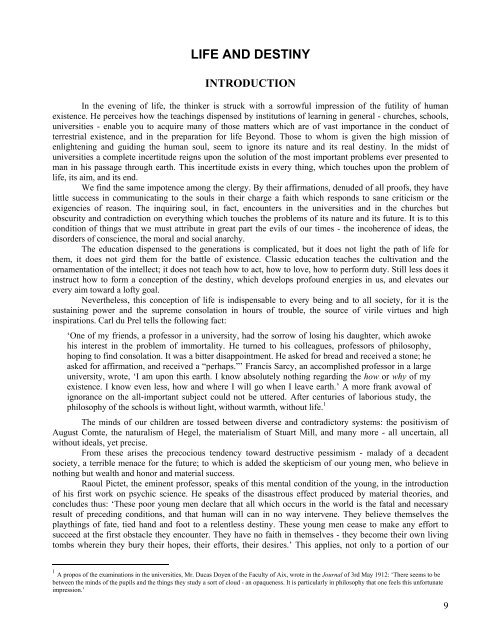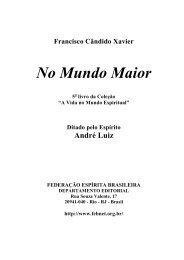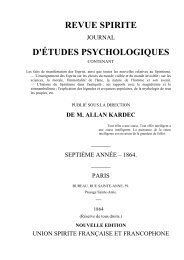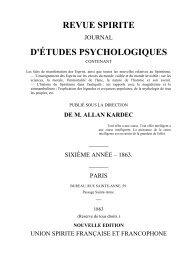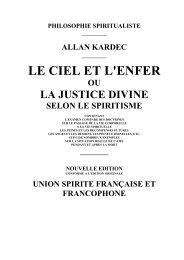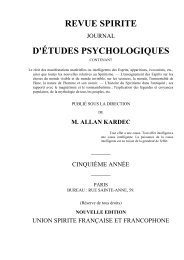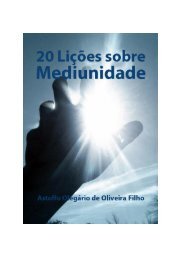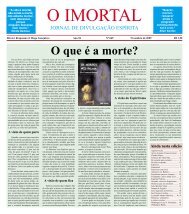PDF version - Geae
PDF version - Geae
PDF version - Geae
Create successful ePaper yourself
Turn your PDF publications into a flip-book with our unique Google optimized e-Paper software.
LIFE AND DESTINY<br />
INTRODUCTION<br />
In the evening of life, the thinker is struck with a sorrowful impression of the futility of human<br />
existence. He perceives how the teachings dispensed by institutions of learning in general - churches, schools,<br />
universities - enable you to acquire many of those matters which are of vast importance in the conduct of<br />
terrestrial existence, and in the preparation for life Beyond. Those to whom is given the high mission of<br />
enlightening and guiding the human soul, seem to ignore its nature and its real destiny. In the midst of<br />
universities a complete incertitude reigns upon the solution of the most important problems ever presented to<br />
man in his passage through earth. This incertitude exists in every thing, which touches upon the problem of<br />
life, its aim, and its end.<br />
We find the same impotence among the clergy. By their affirmations, denuded of all proofs, they have<br />
little success in communicating to the souls in their charge a faith which responds to sane criticism or the<br />
exigencies of reason. The inquiring soul, in fact, encounters in the universities and in the churches but<br />
obscurity and contradiction on everything which touches the problems of its nature and its future. It is to this<br />
condition of things that we must attribute in great part the evils of our times - the incoherence of ideas, the<br />
disorders of conscience, the moral and social anarchy.<br />
The education dispensed to the generations is complicated, but it does not light the path of life for<br />
them, it does not gird them for the battle of existence. Classic education teaches the cultivation and the<br />
ornamentation of the intellect; it does not teach how to act, how to love, how to perform duty. Still less does it<br />
instruct how to form a conception of the destiny, which develops profound energies in us, and elevates our<br />
every aim toward a lofty goal.<br />
Nevertheless, this conception of life is indispensable to every being and to all society, for it is the<br />
sustaining power and the supreme consolation in hours of trouble, the source of virile virtues and high<br />
inspirations. Carl du Prel tells the following fact:<br />
‘One of my friends, a professor in a university, had the sorrow of losing his daughter, which awoke<br />
his interest in the problem of immortality. He turned to his colleagues, professors of philosophy,<br />
hoping to find consolation. It was a bitter disappointment. He asked for bread and received a stone; he<br />
asked for affirmation, and received a “perhaps.”’ Francis Sarcy, an accomplished professor in a large<br />
university, wrote, ‘I am upon this earth. I know absolutely nothing regarding the how or why of my<br />
existence. I know even less, how and where I will go when I leave earth.’ A more frank avowal of<br />
ignorance on the all-important subject could not be uttered. After centuries of laborious study, the<br />
philosophy of the schools is without light, without warmth, without life. 1<br />
The minds of our children are tossed between diverse and contradictory systems: the positivism of<br />
August Comte, the naturalism of Hegel, the materialism of Stuart Mill, and many more - all uncertain, all<br />
without ideals, yet precise.<br />
From these arises the precocious tendency toward destructive pessimism - malady of a decadent<br />
society, a terrible menace for the future; to which is added the skepticism of our young men, who believe in<br />
nothing but wealth and honor and material success.<br />
Raoul Pictet, the eminent professor, speaks of this mental condition of the young, in the introduction<br />
of his first work on psychic science. He speaks of the disastrous effect produced by material theories, and<br />
concludes thus: ‘These poor young men declare that all which occurs in the world is the fatal and necessary<br />
result of preceding conditions, and that human will can in no way intervene. They believe themselves the<br />
playthings of fate, tied hand and foot to a relentless destiny. These young men cease to make any effort to<br />
succeed at the first obstacle they encounter. They have no faith in themselves - they become their own living<br />
tombs wherein they bury their hopes, their efforts, their desires.’ This applies, not only to a portion of our<br />
1 A propos of the examinations in the universities, Mr. Ducas Doyen of the Faculty of Aix, wrote in the Journal of 3rd May 1912: ‘There seems to be<br />
between the minds of the pupils and the things they study a sort of cloud - an opaqueness. It is particularly in philosophy that one feels this unfortunate<br />
impression.’<br />
9


